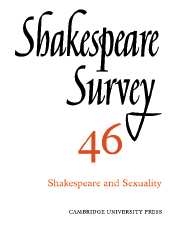Book contents
- Frontmatter
- Shakespeare and Sexuality
- As Who Liked It?
- Malvolio and the Eunuchs: Texts and Revels in Twelfth Night
- The Scandal of Shakespeare’s Sonnets
- Weaving and Writing in Othello
- ‘That’s She that was Myself’: Not-so-Famous Last Words and Some Ends of Othello
- ‘The Catastrophe is a Nuptial’: The Space of Masculine Desire in Othello, Cymbeline, and The Winter’s Tale
- Reconstructing The Winter’s Tale
- Late Shakespeare: Style and the Sexes
- The Virgin Not: Language and Sexuality in Shakespeare
- Fleshing his Will in the Spoil of her Honour: Desire, Misogyny, and the Perils of Chivalry
- Bowdler and Britannia: Shakespeare and the National Libido
- Shakespeare and the Ten Modes of Scepticism
- Shakespeare Performances in England, 1992
- Professional Shakespeare Productions in the British Isles, January-December 1991
- 1 Critical Studies
- 2 Shakespeare’s Life, Times, and Stage
- 3 Editions and Textual Studies
- Books Received
- Index
Fleshing his Will in the Spoil of her Honour: Desire, Misogyny, and the Perils of Chivalry
Published online by Cambridge University Press: 28 March 2007
- Frontmatter
- Shakespeare and Sexuality
- As Who Liked It?
- Malvolio and the Eunuchs: Texts and Revels in Twelfth Night
- The Scandal of Shakespeare’s Sonnets
- Weaving and Writing in Othello
- ‘That’s She that was Myself’: Not-so-Famous Last Words and Some Ends of Othello
- ‘The Catastrophe is a Nuptial’: The Space of Masculine Desire in Othello, Cymbeline, and The Winter’s Tale
- Reconstructing The Winter’s Tale
- Late Shakespeare: Style and the Sexes
- The Virgin Not: Language and Sexuality in Shakespeare
- Fleshing his Will in the Spoil of her Honour: Desire, Misogyny, and the Perils of Chivalry
- Bowdler and Britannia: Shakespeare and the National Libido
- Shakespeare and the Ten Modes of Scepticism
- Shakespeare Performances in England, 1992
- Professional Shakespeare Productions in the British Isles, January-December 1991
- 1 Critical Studies
- 2 Shakespeare’s Life, Times, and Stage
- 3 Editions and Textual Studies
- Books Received
- Index
Summary
MEASURE FOR MEASURE
To begin with, a description of an excellent but disconcertingly politically correct production of Measure for Measure by Compass Theatre Company. The group, directed by Neil Sissons, is a small one and, as with Peter Brook’s A Midsummer Night’s Dream, they generated a stunning new reading of the text by doubling members of the cast. Isabella and Mistress Overdone were played by the same actress; Angelo, Claudio, and Barnardine by one actor, and the authority figures of the Duke and Elbow by another. The revelation of the production came with the recognitions of the last scene. In that final sequence, the Friar is unmasked as the Duke: in this production, in a resonantly quoted gesture, Angelo was also stripped down – the cast wore modern dress – to the long-johns he had worn as Claudio in prison. At the Duke’s question ‘Which is that Barnardine?’ (5.1.477), the actor simply adopted the half-crazed mannerisms he had deployed for Barnardine during the short sequence that follows.
David Westbrook had played Angelo as a compulsively smiling, bespectacled, and totally bald young man whose first act on acquiring power was to tidy the Duke's desk. He looked like the most dangerous sort of train-spotter who revealed his true day-dreams as he wrestled Isabella to the ground at the end of 2.4. Handy-dandy, which was which? The doubling of the actors led to an equation of the 'naturalness' of Claudio's 'tilth and husbandry' with the depravity of Angelo the 'virgin violator': Claudio was merely Angelo in disguise, and, more horribly, Angelo was Claudio in disguise.
- Type
- Chapter
- Information
- Shakespeare Survey , pp. 121 - 136Publisher: Cambridge University PressPrint publication year: 1993

